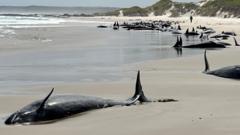The euthanasia decision came after unsuccessful attempts to rescue the animals, which faced extreme stress and were unable to navigate the rough waters back to the sea. Local resident Jocelyn Flint, who witnessed the scene, expressed her heartbreak over the helpless situation of the whales, especially the distress of the young ones. Marine biologist Kris Carlyon emphasized the logistical difficulties in reaching the isolated site and called the conditions the most challenging he's encountered in his 16-year career in wildlife rescue. Wildlife veterinarians made the difficult choice, stating that euthanasia is always a last resort and a means to alleviate suffering.
With Tasmania notorious for whale strandings, this latest incident raises questions about the vulnerability of these social mammals, which often beach in groups. While various theories attempt to explain these phenomena, it remains a heartbreaking reminder of the fragility of marine ecosystems and the welfare of wildlife.
Authorities are now faced with the grim task of disposing of the carcasses responsibly, considering the cultural significance of the site to the Aboriginal community.
This rare event serves to highlight the ongoing challenges in marine conservation and the tragic consequences that can arise from these mass strandings.
With Tasmania notorious for whale strandings, this latest incident raises questions about the vulnerability of these social mammals, which often beach in groups. While various theories attempt to explain these phenomena, it remains a heartbreaking reminder of the fragility of marine ecosystems and the welfare of wildlife.
Authorities are now faced with the grim task of disposing of the carcasses responsibly, considering the cultural significance of the site to the Aboriginal community.
This rare event serves to highlight the ongoing challenges in marine conservation and the tragic consequences that can arise from these mass strandings.



















